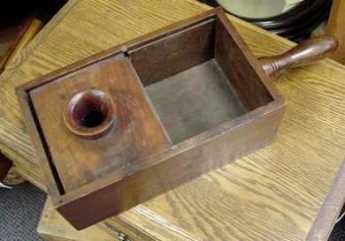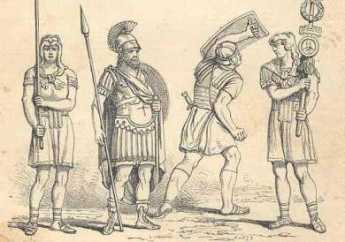Related Topics
Customs, Culture and Traditions
Abundant seafood made it easy to settle here. Agriculture takes longer.
Blackball
It was once the tradition of many clubs that election to membership was only by unanimous consent of the existing members. The method of balloting was to pass around a wooden box with two compartments, one of which contained a mixture of white and black marbles, and the other started out empty. The white marbles were normally larger than the black ones, so a member could reach in and pick a marble without looking, drop it through a hole in the top into the voting compartment -- without enabling others to see what the choice was. Sometimes a black cloth was draped over the top to make the concealment secure. Duels to the death were not uncommon until the late Nineteenth century, so you wanted to be careful. Normally, a single black ball was enough to exclude a prospective member. This tradition traces back through Freemasonry to ancient Greece, where broken pieces of seashell were used for the purpose. The Greek word for such ballots is the stem for the term "ostracize".

|
| Black Ball |
However old and traditional the practice might be, membership by unanimous consent is rapidly dying out. Most probably, the underlying idea of certifying a professional by electing that person to membership in some Society has been replaced by governmental licensing. You are a good lawyer or doctor or barber because the licensing Board says you are and gives you a certificate to that effect. The Licensing Board is entitled to do this by the act of the local state legislature, by sort of a reverse wording: "No person shall practice medicine in this state without a license so to do." That doesn't exactly say the licensed practitioner is a good one, but a licensed practitioner who was excluded from practice in some way would be quick to hire a lawyer. And a court would probably then be persuaded that non-governmentally sanctioned groups may not properly prevent a person from making a living. The right to tell a good one from a bad one has subtly passed from the self-selected leadership of a profession to politicians, using the Greek meaning of politics as "citizenry". To put it another way, the selection and discipline of professionals of many sorts have passed from local groups of distinguished practitioners to groups in the state capitol who may have somewhat different standards but who are at least not in economic competition with the applicants.

|
| Greeks |
Somehow, however, tracing ostracism back to the Medieval guilds seems inadequate to explain its attraction for social clubs, fraternities, debutante balls and the like. One suspicion has to be that these exclusivities are for the purpose of creating breeding pastures. Or at least a variant of arranged marriages, with an artful arrangement of propinquity to do the match-making. In this arena of a social contest, the aspirations of the parents are in conflict with the romantic concepts of the early Nineteenth century, which glorify unhampered choices by the participants. This triumph of eagerness over experience may, in turn, have been a result of the selective elimination of males by the Napoleonic and American Civil Wars, which inevitably created a surplus of marriageable females. Medical advances in preventing deaths in childbirth further expanded the female surplus during the last half of the Nineteenth century.
And then let's trace backward to the Greeks, who apparently originated the concept of ostracism by applying it to citizenship itself. The power of this approach is dramatized by the process of banishment, or denial of the privileges of citizenship. Some pretty important leaders like Themistocles were banished, and then restored to citizenship when it became evident that Athens needed them. The underlying question thus comes right up to the surface: do we need you more, or less, than you need us?
Originally published: Tuesday, June 20, 2006; most-recently modified: Monday, May 20, 2019